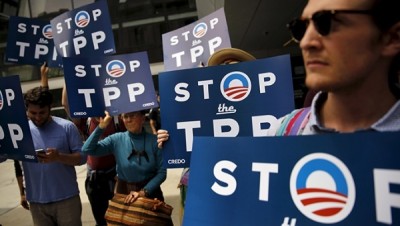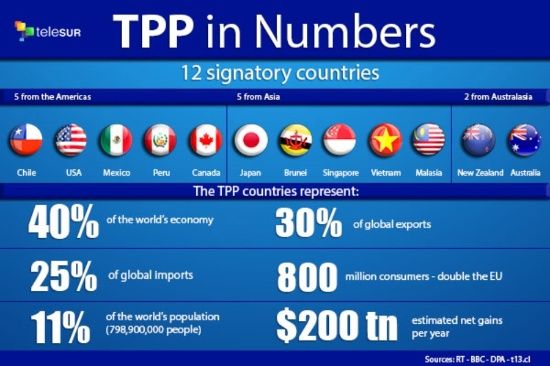TPP Fears Confirmed: “Environmental Risks, Runaway Corporate Power, Weakened Democracy”

Release of the Trans-Pacific Partnership text confirms concerns about environmental risks, runaway corporate power, and weakened democracy.
The text of the controversial Trans-Pacific Partnership was released Thursday after a negotiating process shrouded in secrecy.
The release of the much-guarded text has renewed calls for action to stop the TPP as a “toxic deal” and “disaster for democracy.”
The 12-country transnational trade deal has been widely condemned for privileging corporate profits over international public interests. The secrecy around the deal and the negotiating process, which gave access to large corporations but largely locked out civil society, has been criticized as an assault on democracy.
“The TPP is a disaster for jobs, and environment and our democracy. It is the latest stage in the corporate capture of our society,” said Global Justice Now Director Nick Dearden in response to the release of the text.
The #TPP fails to mention ‘climate change’ in the Environment Chapter https://t.co/Zufbn2MCl2 pic.twitter.com/1PgbwAqrwf
— WikiLeaks (@wikileaks) November 5, 2015
For Sierra Club Executive Director Michael Brune, the fact that the text of the deal doesn’t even include the words “climate change” hints at the kind of corporate sell-off the deal promotes and is “a dead giveaway that this isn’t a 21st-century trade deal.”
The TPP is widely seen by critics as a climate disaster, with lack of protections and “toothless” provisions in the deal’s environmental chapter that could threaten to undermine decades of struggle for the environment, according to Brune.
ICYMI: The Trans-Pacific Partnership text is now out & is “concrete evidence” that it’s a toxic deal https://t.co/7eeP2eB0Me #TPP
— Sierra Club (@sierraclub) November 5, 2015
Campaigners and activists raise particular alarm over the investor-state arbitration mechanism that allows corporations to sue governments for enacting policies that infringe on the company’s potential future profits.
Trade unions criticize the corporate dispute settlement mechanism for promoting the outsourcing and offshoring of local jobs and negatively impacting working conditions. Others warn that the “corporate court” poses serious threats to the climate by discouraging strong environmental regulations since corporations will be able to take legal action against governments for public policies such as limiting mining or fossil fuel extraction.
In fact, the text of the deal reveals new and expanded rights for corporations to take such legal action against governments. Analysts say the rules will empower fossil fuel companies and other corporate giants to challenge environmental and other regulations, and ultimately worsen climate change.
URGENT: we can’t afford to let #TPP undermine the policies needed to combat #ClimateChange! https://t.co/8uB5682SV8 pic.twitter.com/ZMZicTLZdz
— Global Trade Watch (@PCGTW) November 3, 2015
Cases like Oceana Gold versus El Salvador, in which the mining giant is suing the Central American country for impacting profits by putting a moratorium on mining activity, offer a glimpse into the kind of corporate power-play that can be expected under the TPP. In the past, there have been over 600 such corporate challenges to over 100 government policies through similar mechanisms in other trade deals, such as NAFTA.
According to Global Justice Now’s Dearden, the TPP is a “turbo-charged NAFTA,” referring to the 1994 trade deal between Canada, Mexico, and the United States that resulted in more inequality and major job losses in the U.S.
“TPP has less to do with selling more goods, than with rewriting the rules of the global economy is favor of big business,” said Dearden. “Like the North American Free Trade Agreement, 20 years ago, it will be very good for the very richest, and a disaster for everything and everyone else.”
What’s more, Wikileaks has shown that the TPP will crack down on whistleblowing and make investigative journalism even more difficult. According to Wikileaks, the TPP text also reveals a “NSA-friendly” provision regarding telecommunications.
#StopTPP, because the #TPP is a threat to creators & innovators. Learn more from @EFF: https://t.co/S7008hR6UW pic.twitter.com/cBxfSNXWWy
— Global Trade Watch (@PCGTW) November 3, 2015
Countries in the deal now have a window to ratify or block the TPP. While U.S. multinational corporations will be eager to get the deal past lawmakers, activists around the world are looking to seize the opportunity to increase pressure on governments to put an end to the TPP once and for all.
Unions, environmental activists, consumer rights groups, and other campaigners will be ramping up their organizing to fight the TPP in coming months.
The 12-country trade agreement includes Australia, Brunei, Canada, Chile, Japan, Malaysia, Mexico, New Zealand, Peru, Singapore, the United States, and Vietnam.


